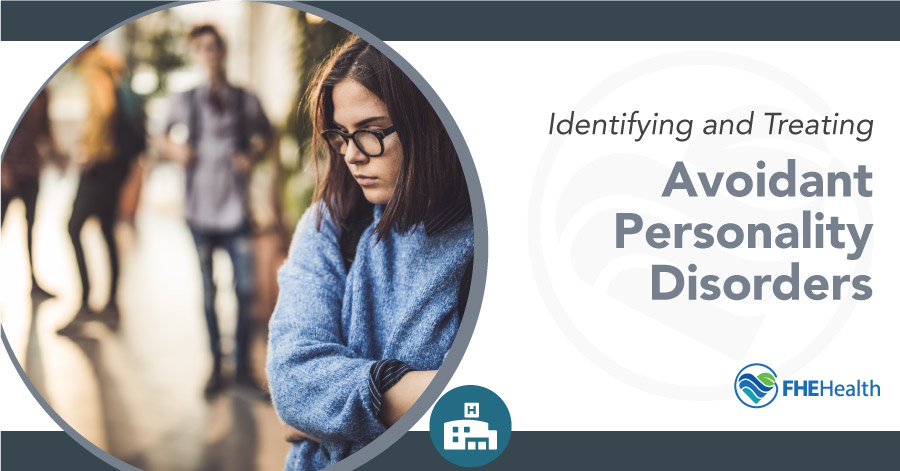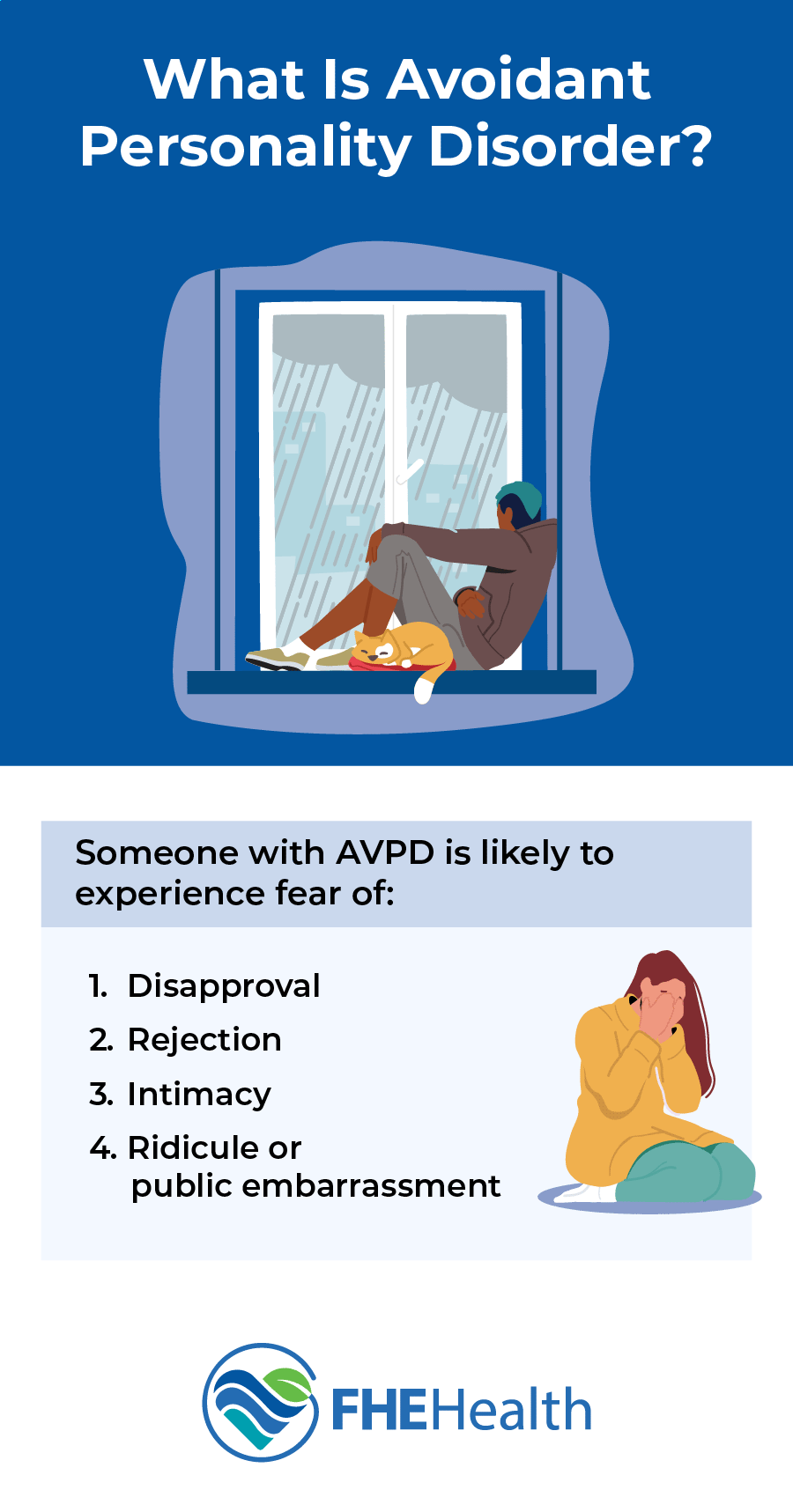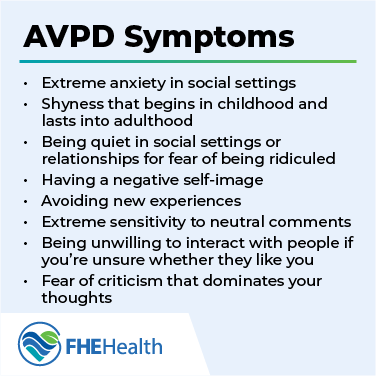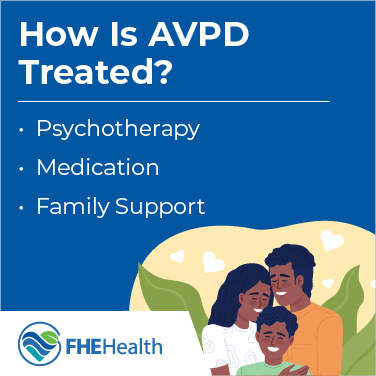
Avoidant personality disorders are more prevalent in the United States than you might think. The condition affects approximately 1.5%-2.5% of Americans, with some studies identifying women as being at a higher risk for the disorder.
Find out how to identify symptoms of avoidant personality disorder (AVPD) and what treatment options are available.
What Is Avoidant Personality Disorder?
 AVPD is a personality disorder that causes feelings of chronic inadequacy and fear of negative judgment by others in a social setting. Sensitivity to criticism and inhibition about participating in social activities are common experiences for people with AVPD.
AVPD is a personality disorder that causes feelings of chronic inadequacy and fear of negative judgment by others in a social setting. Sensitivity to criticism and inhibition about participating in social activities are common experiences for people with AVPD.
Someone with AVPD is likely to experience fear of:
- Disapproval
- Rejection
- Intimacy
- Ridicule or public embarrassment
People with AVPD may also have difficulty believing they are liked by others. This insecurity may cause them to misinterpret comments that are not intended to be hurtful as negative or critical.
What Are the Causes of AVPD?
The precise cause of AVPD and other personality disorders is currently unknown. However, genetics and environmental factors are thought to contribute to the presence of this condition. Early interactions with caregivers and parents are likely to influence the presence of AVPD in children. AVPD has been linked to a history of experiencing neglect or abuse; overall, people with AVPD are more likely to say they felt their parents were not affectionate or encouraging.
The symptoms of AVPD typically appear at an early age and impact the individual for their entire life. However, treatment can help manage the disorder and reduce the effect it has on quality of life.
At one point, researchers thought that APD occurred only in conjunction with Seasonal Affective Disorder (SAD). However, further study shows two-thirds of people with an avoidant personality disorder don’t meet the criteria for a diagnosis of SAD. AVPD is commonly comorbid with other mental health conditions like depression or substance abuse. Individuals with AVPD may also be at an increased risk for suicidal thoughts and attempts.
The National Suicide Prevention Lifeline is available 24/7 at 1-800-273-TALK (8255).
What Are the Avoidant Personality Disorder Symptoms?
 People with AVPD fear rejection and social humiliation so strongly that they prefer isolation to any social situation. Common symptoms associated with avoidant personality disorder include:
People with AVPD fear rejection and social humiliation so strongly that they prefer isolation to any social situation. Common symptoms associated with avoidant personality disorder include:
- Extreme anxiety in social settings
- Shyness that begins in childhood and lasts into adulthood
- Being quiet in social settings or relationships for fear of being ridiculed or rejected
- Having a negative self-image
- Avoiding new experiences or taking social risks
- Extreme sensitivity to neutral comments
- Being unwilling to interact with people if you’re unsure whether they like you
- Fear of criticism that dominates your thoughts
If you’re experiencing four or more of these symptoms, you could be dealing with an avoidant personality disorder. You’ll need to consult your family physician for a referral to a psychologist or psychiatrist to receive an official diagnosis.
How Is AVPD Typically Diagnosed?
If someone is experiencing symptoms consistent with AVPD, their health care provider may begin with evaluating their medical history and a physical exam. There’s currently no diagnostic test to confirm the presence of AVPD. However, physical exams help rule out possible illnesses causing similar symptoms.
Once your physician rules out potential physical causes of your symptoms, they may refer you to a psychologist or psychiatrist for further treatment and assessment. To receive an AVPD diagnosis, you must have experienced an onset of symptoms by early adulthood. Roughly 30% of people with a social phobia meet the criteria for an AVPD diagnosis. This demonstrates that AVPD currently occurs in conjunction with other conditions.
What Should You Do If You Think You Have AVPD?
If you suspect you might have AVPD, it’s important to seek professional help and surround yourself with a support network to manage your symptoms. Having AVPD makes it easy to become socially isolated and experience complications in your relationships due to avoidant behaviors. Due to the increased risk of substance abuse, depression and anxiety, people with AVPD may have additional mental health conditions that require therapy or medication to manage successfully.
Not undergoing treatment for AVPD can result in these additional conditions developing or worsening due to isolation. Although treatment for AVPD doesn’t change a shy personality, it can provide you with the tools to navigate social settings and cope better.
How Is AVPD Treated?
 Treatment is essential to manage avoidant personality disorder successfully. However, improving the condition takes time because the thought patterns and learned behaviors resulting from AVPD are ingrained in you after being practiced for many years. With a commitment to treatment and proper care, you can develop the tools to recognize when you’re experiencing symptoms of AVPD and take action to change your response.
Treatment is essential to manage avoidant personality disorder successfully. However, improving the condition takes time because the thought patterns and learned behaviors resulting from AVPD are ingrained in you after being practiced for many years. With a commitment to treatment and proper care, you can develop the tools to recognize when you’re experiencing symptoms of AVPD and take action to change your response.
Psychotherapy
Talk therapy (also called psychotherapy) is the most common form of treatment for AVPD. These therapy sessions can be Cognitive Behavioral Therapy (CBT) or behavioral therapy sessions. While CBT focuses on reprogramming your thought patterns and mental responses, behavioral therapy emphasizes a physical action and reward system.
Cognitive behavior group therapy (CBGT) has also proven effective for treating and managing AVPD. These sessions help participants with social skills training, cognitive restructuring and graduated exposure to socialization. These exercises help you prepare for further social integration.
Medication
There is no medication treatment specifically for AVPD. However, if you are experiencing conditions like anxiety or depression, your doctor may prescribe antidepressants or antianxiety medications to improve your symptoms and mental health overall.
Typically, medication is most effective for AVPD treatment when used in combination with psychotherapy sessions.
Family Support
Beyond seeking professional treatment options like medication and psychotherapy, a supportive group of family members or close friends can improve your outcomes. Having people you trust and feel supported by helps minimize feelings of isolation without producing typical anxiety levels in a social setting.
Recognize the Signs and Seek Support for Avoidant Personality Disorder
If you believe you’re experiencing symptoms consistent with avoidant personality disorder, consider seeking professional support through a treatment center like FHE Health. Our facility is a safe space for accessing mental health care and getting your life back on track.
We help you focus on long-term recovery and living with a personality disorder so you can experience a higher quality of life. Our dedicated team of counselors is standing by 24/7 to take your call and help you start the process of improving your mental health. To learn more or book a treatment, call us today at (833) 596-3502.






